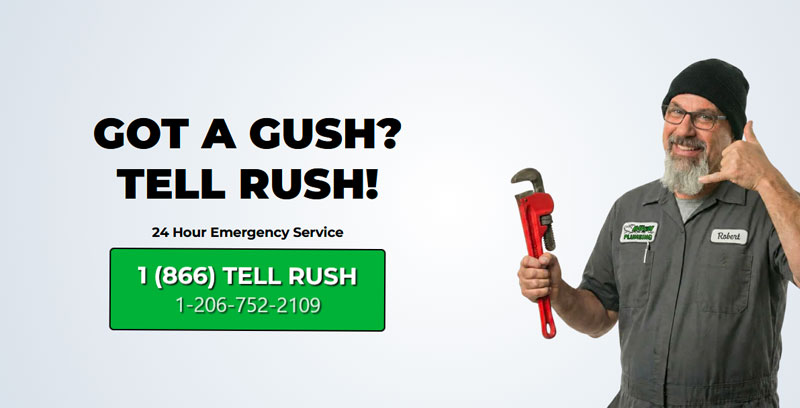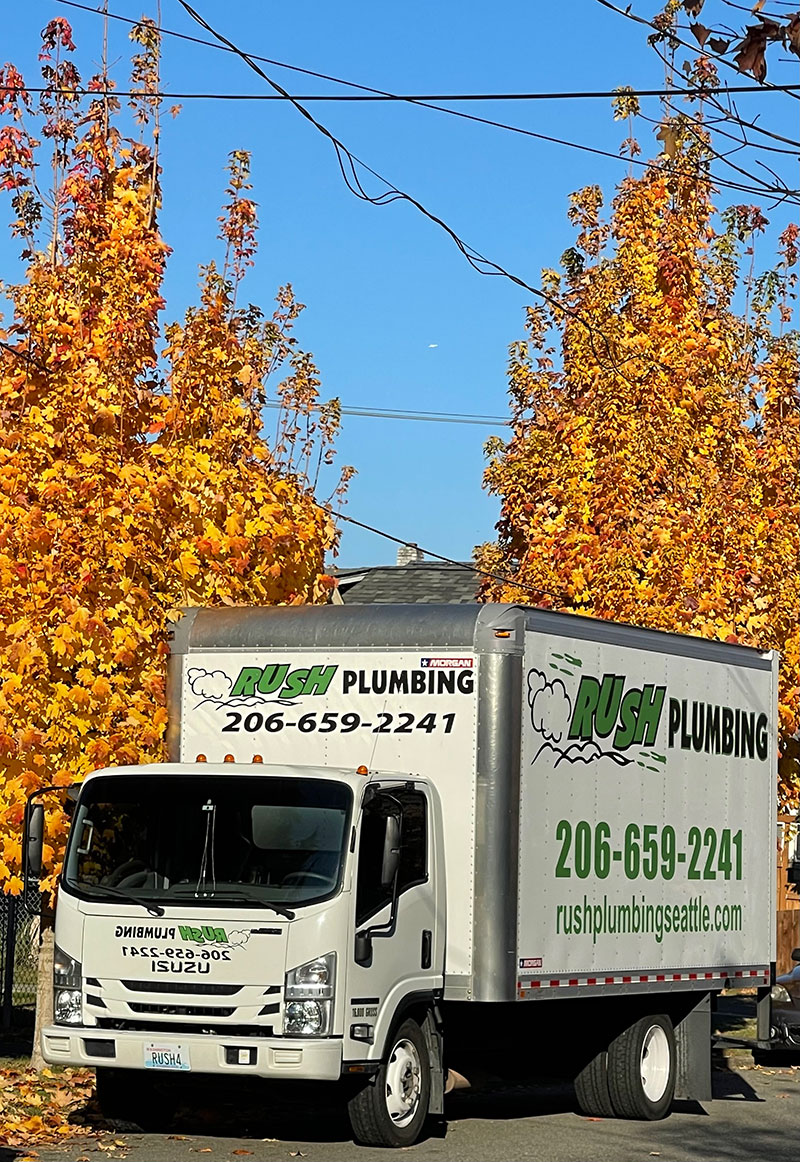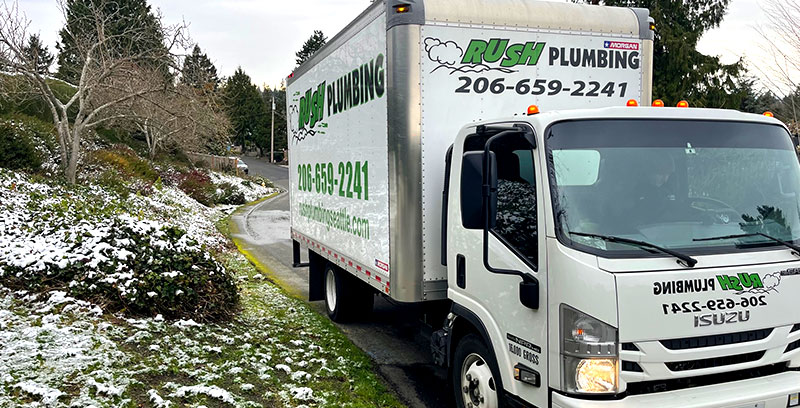
West Seattle’s Plumbing Problems Need Rush Plumbing Instant Acccess Plumbers
Clogged drains? Old pipes? Basement flooding every time it rains? At Rush Plumbing we specialize in the real problems our neighbors face — from side sewer repairs to eco-friendly repipes. Fast, local, and reliable service — because we’re just a phone call away, 24/7.
Call us today for a free estimate or same-day service!
Schedule West Seattle Plumbing Service With Our
Expert Team of Plumbers Today!
 West Seattle is the oldest neighborhood in the city and considered the birthplace of the modern city of Seattle. It has a unique mix of older homes, newer infill, and tricky terrain for plumbing issues.
West Seattle is the oldest neighborhood in the city and considered the birthplace of the modern city of Seattle. It has a unique mix of older homes, newer infill, and tricky terrain for plumbing issues.
West Seattle Sewer & Side Sewer Services
Seattle homeowners are legally responsible for their side sewer (from the house to the city main). Many are old clay, cast iron, or Orangeburg pipes, which fail or get root intrusion. That is why Rush Plumbing offers:
- Video inspections (before buying/selling homes).
- Hydro-jetting and trenchless repairs (CIPP lining, bursting).
- Emergency root removal and side sewer replacement.
We also offer Drainage & Stormwater Solutions
Heavy rains + hilly lots can cause frequent flooding, sump pump failures, and soggy basements.
That is why Rush Plumbing offers:
sump pump repair & installs
West Seattle rains are no joke — keep your basement dry year-round.
We offer Repiping Older Homes in West Seattle
Many West Seattle homes (built 1900s–1960s) still have galvanized steel or cast iron. Which can result low water pressure, rusty water, leaks, hidden mold.
That is why Rush Plumbing offers:
PEX installs and repair along with copper repair and repipes
Tired of brown water and weak showers? Upgrade your plumbing and add value to your home.
Eco-Friendly & Water-Saving Fixtures for West Seattle
Seattle is a green city with eco-minded customers.
That is why Rush Plumbing offers:
low-flow fixtures, tankless water heaters, high-efficiency hot water recirculation.
Save water, save money — eco-friendly plumbing for West Seattle homes.
Water Heater Services in West Seattle
Many homes need water heater replacements or tankless upgrades.
That is why Rush Plumbing offers:
same-day replacement and repairs for emergencies
Hot water today — tank or tankless installs done fast.
West Seattle Emergency Plumbing & Rapid Response
West Seattle is semi-isolated (bridges, traffic). Many people want local plumbers who can show up quickly. That is what we do, we are available anytime, 24/7.
Schedule West Seattle Plumbing Service With Our
Expert Team of Plumbers Today!
Rush Plumbing Services for West Seattle:
- Side Sewer & Drain Services
- Video inspections (pre-purchase or problem diagnosis)
- Trenchless side sewer repair & replacement
- Root intrusion removal & hydro-jetting
- Emergency sewer backups & drain clearing
- Drainage & Stormwater Control
- Sump pump installs & maintenance
- French drains & yard drainage solutions
- Downspout tie-ins & stormwater compliance
- Basement flooding prevention systems
- Repiping & Pipe Repairs
- Whole-home PEX or copper repipes
- Replacement of galvanized steel & cast iron pipes
- Leak detection & hidden water damage repair
- Water pressure restoration
- Water Heater Solutions
- Tankless water heater installs & maintenance
- Same-day hot water tank replacement
- Recirculation systems for instant hot water
- Eco-friendly, high-efficiency upgrades
- Fixture & Appliance Plumbing
- Low-flow toilets, faucets, & shower heads
- Dishwasher, fridge, and laundry hookups
- Garbage disposal installs & repairs
- Outdoor hose bibs & irrigation tie-ins
- Emergency & Local Response
- 24/7 plumbing emergencies
- Fast response times — we’re based in West Seattle
- Transparent, upfront pricing — no hidden fees

Common Plumbing Problems
in West Seattle
- Aging / Outdated Pipe Materials
Many older homes in West Seattle still have galvanized steel, cast iron, clay, or even Orangeburg sewer pipes. These materials degrade over time.
Corrosion, sediment buildup, or rust can reduce water pressure, cause discolored water, leaks, or eventual pipe failure. - Tree Root Intrusion in Side Sewers / Sewer Lines
West Seattle has lots of mature trees. Roots often enter older side sewer or sewer mains through joints or cracks. The roots can block flow, cause backups, or even break pipes.
Seattle’s “side sewer defects and issues” documentation explicitly lists tree root damage as common. - Clogged Drains, Slow Drains
Due to accumulated soap scum, grease, hair, debris. Also impacted by root intrusion in outdoor sewer laterals.
Poor venting or offset joints (misaligned pipe sections) exacerbate drains issues. - Leaks and Hidden Water Damage
Leaks from old pipes, joints, fixtures. Hidden leaks (behind walls, under floors, in crawl spaces) are frequent in older homes. These lead to mold, rotting, structural issues. - Low Water Pressure
Causes include narrowing of pipe interior (from corrosion or mineral buildup), long/undersized runs (especially in older homes), or clogged fixtures. - Water Heater Problems
Including sediment buildup, reduced efficiency, noisy operation, rust/discolored water, uneven heating, or outright failure. Many older units reach end of life and/or weren’t sized or positioned optimally. - Side Sewer Defects
Seattle’s Side Sewer program identifies common defects: offset joints, exposed aggregate (interior wear of concrete pipes where the cement erodes, leaving rock surfaces), cracks, root intrusion. These affect sewer flow and structural integrity. - Water Quality / Discoloration
Due to corroded/old pipe materials or rust, people sometimes get discolored water (brown, red) especially after downtime (e.g. after long periods with water off) or pressure changes. - Storm / Rain-Related Backup / Drainage Issues
West Seattle’s heavy and frequent rains can overwhelm drainage, lead to water infiltration, sump pump overworking, or even basement flooding in some places. Especially if gutters/downspouts are clogged or misrouted. Local soil saturation and high groundwater can contribute. - High Utility Bills due to Hidden or Minor Leaks
Because leaks can be hard to see (in walls, under floors), they can persist and waste water for long periods. This shows up as unexpectedly high water bills. - Side Sewer / Shared Responsibility Issues
Defects in side sewer laterals (owned by property, but connecting to public sewer) are a frequent source of issues. Whether it's root intrusion, offset joints, or pipe deterioration, property owners are responsible for maintenance. - Odors & Gurgling Sounds
Poor venting, sewer backups, clogged traps, or compromised sewer or side-sewer lines can cause sewer or drain odors or gurgling/funny sounds in plumbing.
Schedule West Seattle Plumbing Service With Our
Expert Team of Plumbers Today!
West Seattle Plumbing
Requirements & Considerations
- Code Adoption & Updates
Seattle enforces the 2021 Washington State Plumbing Code with Seattle-amendments.
As of November 15, 2024, Seattle has adopted the 2021 versions of many of its construction codes.
Make sure your plumbing design is compliant with current Seattle/King County plumbing code requirements. Old plans or plumbers used to earlier codes might not meet new standards. - Water Availability & Pressure
To build a new home or change water service, you’ll need a Water Availability Certificate (WAC) from Seattle Public Utilities (SPU). It checks whether water mains, hydrants, and system capacity are adequate.
Fire flow requirements may also need to be met, which often ties into pipe sizing and main location. - Side Sewer / Lateral Connections
The “side sewer” is everything from your building’s plumbing up to its connection to the public sewer main under the street. That includes any pipes, laterals, etc.
The property owner is responsible for owning & maintaining the side sewer, including repairs, unless you get some program assistance or specific permits.
You’ll need a side sewer permit for new side sewer installs, modifications, repairs, relocations, etc. - Stormwater / Drainage Integration
Seattle’s Stormwater Code (effective since July 1, 2021) sets standards for how you capture, treat, and manage stormwater runoff from new development.
On lots with steep slope or lots with large impervious surfaces, this becomes especially important: you’ll need design for flow control, quality treatment, etc.
There’s an upcoming Stormwater Code and Manual update (2026) that may impose additional changes. - Backflow Prevention & Cross-Connection Control
If there is any possibility of contamination (e.g. irrigation systems, fountains, mixing of non-potable water), you’ll need proper backflow prevention devices. SPU and Seattle Public Health enforce these rules.
Testing of backflow devices is required on an ongoing basis (usually annually). - Fixture Efficiency / Conservation
Seattle (and more broadly Washington State) imposes limits on water fixture flow rates to reduce water use. For example, toilets, shower heads, faucets typically have max flow requirements. (These reduce both water consumption and sewer throughput)
Ensuring your design uses “low-flow” or “high efficiency” fixtures can both satisfy code and reduce long-term costs. - Side Sewer Mapping & Existing Infrastructure
You can check side sewer “cards” and maps via the Seattle SDCI tool to see where existing side sewer laterals are located for your parcel. Good to know for planning connections and potential conflicts.
If your lot is older, existing side sewers might be degraded, undersized, or misaligned; replacing or relocating laterals can be expensive and needs permitting. - Permits & Inspections
Any significant plumbing work (new house, major additions, changes to plumbing layout, major fixture swaps) will need plumbing permits through Public Health – Seattle & King County (or city as applicable) under the Seattle Plumbing Code.
Inspections along the way to make sure drains, vents, backflow, etc. are properly installed. - Septic / Sewer Access
If your lot is connected to a public sewer main, then side sewer rules apply. If not (rare in Seattle but maybe on fringe or special lots), septic or alternative wastewater systems might be necessary, which have their own rules.
Also ensure adequate slope for sewage lines, venting, and clean-outs, particularly on hills. These are often nontrivial in hilly or sloped lots (which West Seattle has). - Groundwater / Soil / Topography Effects
Lots with high water table or poor soil drainage will require special foundation waterproofing, sump pumps, possibly drainage tiles, etc. Plumbing (especially stormwater and drainage) must accommodate this.
Steep lots may necessitate long runs of plumbing, special venting, maybe pumping in certain cases (or pressure boosting). - Costs & Longevity
Material choice matters: copper, PEX, CPVC, etc. Seattle climate is mild but still wet; quality installations help avoid leaks, freeze issues (in cold snaps), corrosion.
Access for maintenance of side sewer / clean-outs matters: making sure there are accessible clean-out points and maintenance paths.


